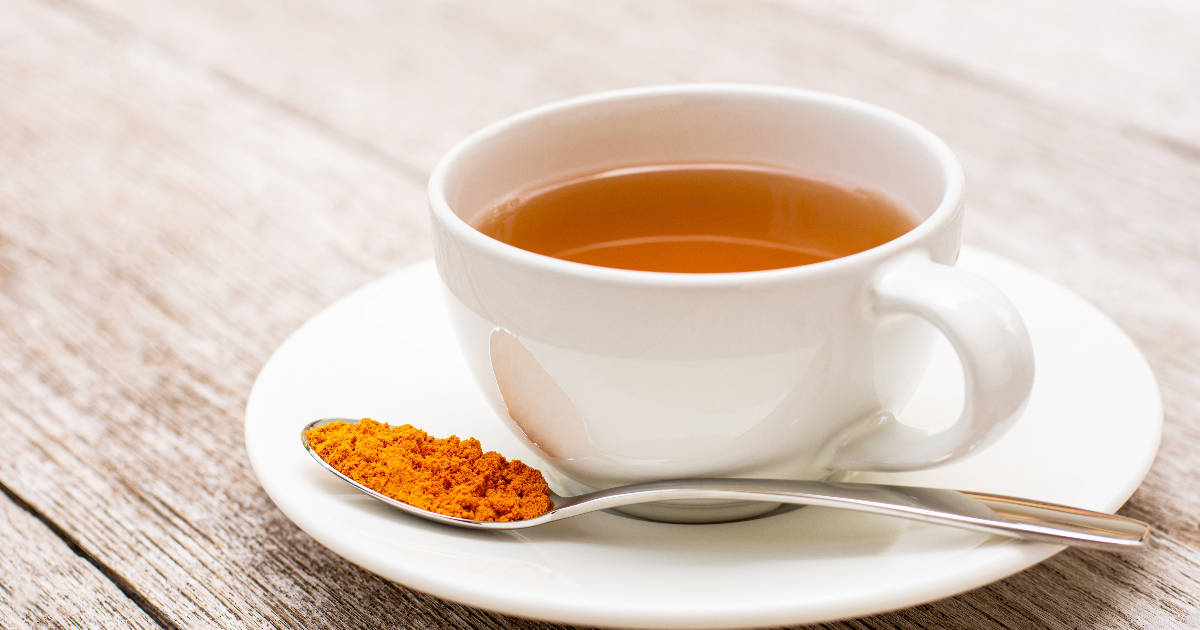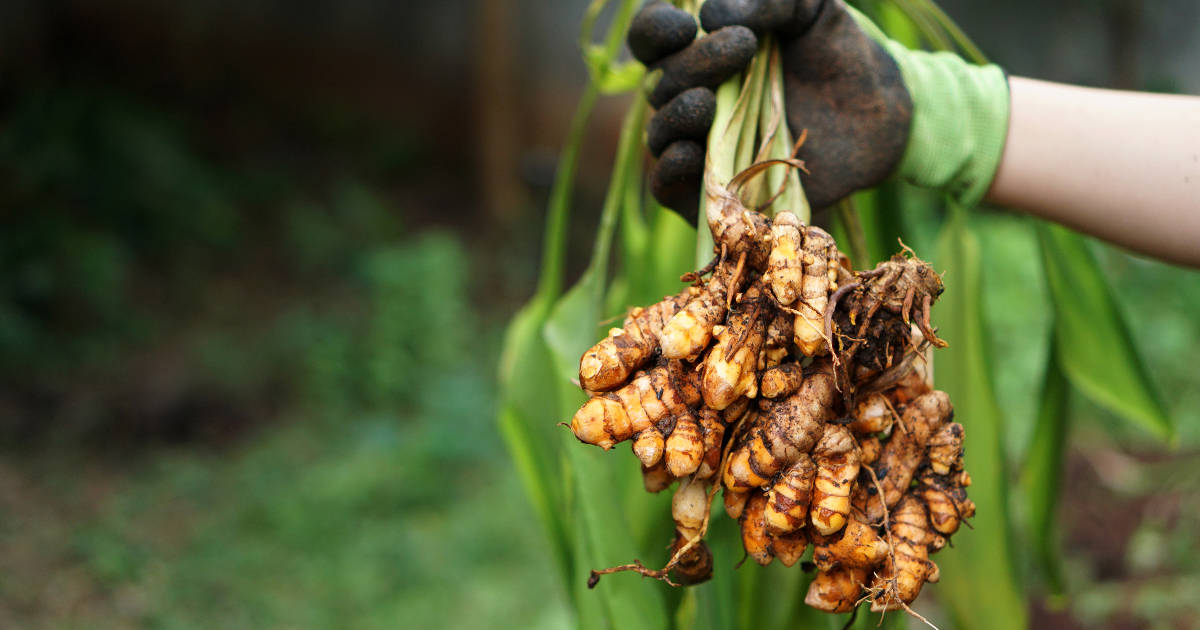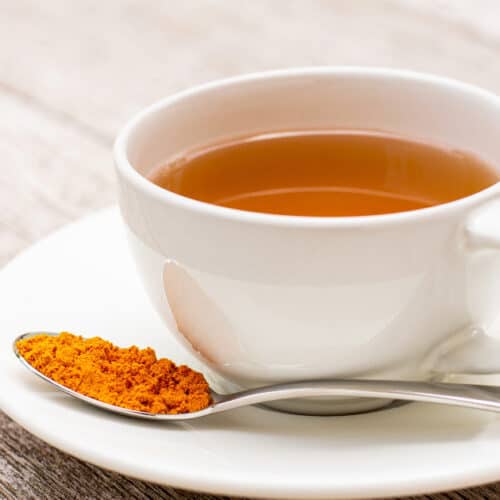Turmeric powder can absolutely be added to tea. In fact, turmeric tea is a popular beverage that has been consumed for centuries in places like India where the turmeric plant originates.

Adding turmeric powder to your tea can provide some great health benefits, while also creating a robust, earthy, and slightly spicy flavor. Read on to learn more about the benefits of turmeric powder tea, how to make it, and some delicious recipe ideas.
What Is Turmeric?

Turmeric is a spice that comes from the turmeric plant. It has a brilliant golden yellow color and a warm, bitter, yet earthy flavor. Turmeric has been used for thousands of years in cooking, natural medicine practices like Ayurveda, and cultural rituals.
The turmeric plant grows natively throughout parts of India, Asia, and other tropical regions. Its botanical name is Curcuma longa and it's part of the ginger family of plants, Zingiberaceae.
The part of the turmeric plant that is used as a spice is the rhizome or root-like underground stem. These rhizomes are boiled, dried, and ground into the familiar bright yellow powder we know as turmeric spice.
Key Active Compounds in Turmeric
What makes turmeric potentially beneficial is that it contains bioactive compounds called curcuminoids. The most well-studied curcuminoid is curcumin, which gives turmeric its color and many of its potential effects.
Curcumin has demonstrated anti-inflammatory, antioxidant, antimicrobial, immunomodulatory, and anticancer activities in laboratory studies. However, curcumin has low bioavailability, meaning it is poorly absorbed into the bloodstream. So to reap the benefits of curcumin, it needs to be consumed along with agents that can enhance its absorption like black pepper or fats.
The Potential Benefits of Turmeric Tea
Adding turmeric powder to tea may provide the following evidence-based health benefits:
Anti-inflammatory effects: Curcumin in turmeric has potent anti-inflammatory properties which may help relieve inflammation-related disorders like arthritis, inflammatory bowel disease, cardiovascular disease, and autoimmune conditions.
Antioxidant activity: Curcumin demonstrates antioxidant effects which help neutralize free radicals and oxidative stress in the body. This may have benefits for chronic diseases, immune health, and slowing the aging process.
Reduced risk of heart disease: Curcumin may improve cardiac health by reducing LDL cholesterol, blood pressure, and risk of blood clot formation. This may lower the likelihood of atherosclerosis, heart attacks, and strokes.
Boosts immunity: Curcumin in turmeric enhances immune function by stimulating antibodies, T-cells, B-cells, and other components of the immune system involved in fighting pathogens. This may fend off illnesses like the common cold or flu.
Supports joint health: Thanks to its anti-inflammatory and antioxidant properties, curcumin may help relieve joint pain and inflammation from arthritis. It may be comparable to some conventional medications.
Supports digestive health: Curcumin appears to modulate gut flora, stimulate bile production, and ease symptoms of digestive conditions like irritable bowel syndrome and ulcerative colitis.
Neuroprotective effects: Curcumin may cross the blood-brain barrier and help protect the brain and central nervous system against neurodegenerative diseases like Alzheimer's and Parkinson's disease.
Antimicrobial properties: Test tube studies indicate curcumin has antiviral, antibacterial, and antifungal effects against various pathogens. More human research is needed in this area.
Anticancer potential: Curcumin demonstrates anticancer activities in lab studies and may sensitize cancer cells to conventional treatment. However, clinical trials are still ongoing to verify the effects in humans.
How to Make Turmeric Tea with Powder

Turmeric Tea with Powder
Ingredients
- 1/2 teaspoon turmeric powder
- 1 cup water
- 1/4 teaspoon freshly cracked black pepper (optional but recommended)
- Lemon juice, to taste (optional)
- Honey, to taste (optional)
Instructions
- Boil the water in a small saucepan.
- Once boiling, turn down the heat to low and stir in the turmeric powder.
- Allow the turmeric tea to simmer gently for 5-10 minutes, stirring occasionally.
- Turn off the heat and stir in the black pepper. Allow to steep for 5 more minutes.
- Strain the turmeric tea through a fine mesh sieve or tea strainer into a cup to remove any gritty powder.
- Stir in lemon juice and honey to taste, if using.
- Enjoy the turmeric tea warm. You can also chill it and enjoy over ice if you prefer.
Key Takeaway: Simmer turmeric powder in hot water for 5-10 minutes then strain into a cup to make a basic golden turmeric tea. Add black pepper to boost curcumin absorption.
Flavoring and Serving Suggestions
There are endless ways to enhance your turmeric tea with different flavors and ingredients:
- Warming spices: Add a pinch of ground ginger, cinnamon, cardamom, clove, star anise, or nutmeg.
- Herbal flavors: Try steeping with chamomile, green tea, mint, or rosemary.
- Citrus flavors: Stir in lemon, lime, grapefruit, or orange juice. You can also add citrus zest.
- Sweeteners: Honey, maple syrup, agave, or stevia can be used to sweeten the tea.
- Healthy fats: Coconut milk, full-fat cow's milk, nut milk, or ghee can help the absorption of curcumin.
- Aromatics: Infuse your tea with a vanilla bean, pandan leaf, lemongrass stalk, or lavender buds.
- Fruits: Stir in fresh berries, mango, pineapple, or apple slices.
Turmeric tea can be enjoyed first thing in the morning, after meals, or before bed. It's naturally caffeine-free so it won't disrupt sleep patterns.
Some people prefer to enjoy turmeric tea warm, while others like to chill it and drink over ice. Garnish your tea with lemon wheels, fresh mint, or a cinnamon stick for extra flair.
FAQs
How much turmeric powder should I add to my tea?
For most people, adding 1/4 - 1/2 tsp of turmeric powder per cup of tea is a safe amount with potential benefits.
Is it better to use fresh turmeric versus powder?
Both fresh and dried turmeric powder work well for making tea. Using fresh turmeric root will provide a more robust flavor.
What's the best way to brew turmeric tea?
Simmer the turmeric powder in hot water for 5-10 minutes, then strain the tea through a sieve before drinking to remove any sediment.
Can I drink turmeric tea daily?
Yes, drinking 1-2 cups of turmeric tea per day is safe for most people. But listen to your body and reduce intake if you experience any side effects.
When is the best time to drink turmeric tea?
Some people prefer turmeric tea first thing in the morning on an empty stomach. Others like it after meals or before bed since it's naturally caffeine-free.
Does turmeric tea stain teeth?
Turmeric contains deep yellow pigments that can temporarily stain teeth or skin with frequent use. Brushing your teeth after drinking can help minimize stains.
Conclusion
Turmeric powder is an excellent addition to tea, providing a burst of flavor and color along with a wide range of science-backed health benefits.
Curcumin is the key active compound in turmeric that demonstrates antioxidant, anti-inflammatory, antimicrobial, and immune-boosting properties that may help protect against chronic diseases.
To make basic turmeric tea, simply simmer turmeric powder in hot water for 5-10 minutes then strain before drinking. Add black pepper to enhance curcumin absorption. Feel free to experiment with different ingredients and flavors like citrus, warming spices, herbs, sweeteners, and milk.
Enjoy turmeric tea in moderation, limiting intake to 1-2 cups per day. Be cautious if you have any medical conditions or take certain medications as turmeric can interact with other drugs. Otherwise, sip your way to good health with this ancient Ayurvedic beverage.

